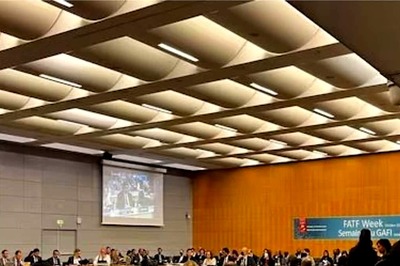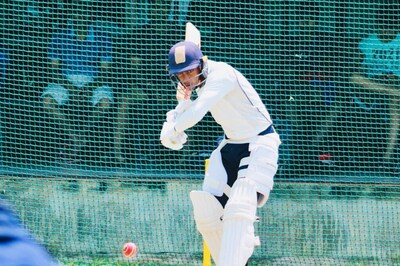
views
What does “salam alaikum” mean?”
It means “peace be upon you.” “Salam Alaikum” is an Arabic greeting that literally translates into “peace be upon you.” It can be used by both Muslims and non-Muslims in the Arabic speaking world and is in fact used by many Arabic-speaking Christians and Jews. One of the main pillars of Islam is the spread of peace and “salam” is Arabic for “peace,” which is why Muslims are encouraged to use this as a greeting among one another. “As-Salam” is one of the 99 names of Allah as mentioned in the Quran, meaning “The Giver of Peace.” “Salam Alaikum” also supports the Islamic practices of spreading humility between social classes, strengthening bonds with the community, and the reassurance of faith. The grammar and pronunciation of the phrase varies across regions and dialects. In a casual setting, you can use the the shortened “salam” which simply means “peace.”
What is the proper response to the greeting?
The appropriate response is “wa alaikum salam.” If an Arabic-speaker greets you with their native salution of “salam alaikum,” meaning, “peace be upon you,” you may reply with, “wa alikum salam,” meaning, “peace be also with you.” A longer, more formal reply is, “assalamualaikum warahmatullahi wabarakatuh.” This iteration is not only a greeting but a declaration of faith among Muslims, translating into, “Peace be upon you and God’s mercy and blessings.” Muslims are encouraged to exchange these greetings at all gatherings, as it is written in the Quran. An-Nisa 4:86 reads, “And when you are greeted, respond with a better greeting or at least similarly. Surely Allah is a [vigilant] Reckoner of all things.” The greeting should be initially exchanged by one person walking toward a seated person, by those of an upper class to those of a lower one, and from the young to the old. Despite these observed social rules, it’s never a bad thing to say “salam alaikum” first. The person being greeted should meet, or preferably exceed, the other’s generosity in their reply.
Is it offensive to use “salam alaikum”?
Not unless it is being mocked or culturally appropriated. The peaceful greeting is highly encouraged by Islam as a means of spreading peace, one of the major tenets of the religion. While it’s used by Arabic-speakers everywhere, whether they be Muslim, Christian, Jewish, or other, the context in which you’re saying “salam alaikum” is important. If you’re Muslim, use of the greeting is not only allowed but incentivized, as spreading peace to mankind is one of the ways to guarantee entry into heaven. If you’re a non-Muslim Arabic speaker, greeting someone with “salam alaikum” might simply be part of your culture and something you don't need to second-guess. If you’re a non-Muslim, non-native speaker of Arabic, you should never open with “salam alaikum,” unless greeted by a Muslim in this way. Then, you may respectfully reply with “wa alaikum salam.”
Role of the Phrase in Islam
“Salam” or “peace” is one of the foundations of Islam. “Salam” or “peace” is one of the 99 names of Allah, or God, and carries great significance to Muslims everywhere. When a Muslim greets you with “salam alaikum,” they are expressing their most earnest wishes for your safety, protection, and good fortune, acting as a verbal shield from evil. It showcases purity of heart and goodness between friends, family members, and even strangers. The phrase appears 7 times in the Quran, written as “salamun ʿalaykum.” According to the Quran, the first instructions Muhammed gave upon arriving in Medina, or the first Islamic state, was to spread peace. He also meant for the greeting to be shared with every Muslim, stating, “You feed others and offer greetings to both those you know and those you do not know.” The longer the variation of the greeting– whether it be “wa alikum salam,” “assalamualaikum warahmatullahi wabarakatuh,” or others—the more favor one gains with Allah. Islam is a religion founded on peace, and promoting peace is one of the most important philosophies Muslims live by.
Use of the Phrase in Other Cultures
The Hebrew equivalent is “shalom aleichem.” Meaning “peace be upon you” in Hebrew, this similarly Semitic variation doesn’t stray too far from the original. Exchanged between Jews everywhere and frequently used by Ashkenazi Jews, the phrase holds a more concrete religious meaning than its Arabic counterpart. The correct response to this greeting is “aleichem shalom,” which means, “unto you peace.” The greeting appears 6 times in the Talmud, or book of rabbinic scriptures. The popular song, “Shalom Aleichem,” is often sung before the Friday evening Shabbat meal. It was composed by Rabbi Israel Goldfarb in 1918.
In Central Asia, the shortened “salam” is more commonly used. Countries such as Afghanistan, Azerbaijan, and Tajikistan have large Muslim populations, which have seen continued growth as a result of social issues. The term, “salam,” is more commonly used as a greeting, along with other variations of the peaceful phrase, some meaning “go with God.” Afghanistan is home to an estimated 38 million people, with Muslims making up about 90% of the population. Azerbaijan has a population of 10 million, with a 96% Muslim majority. Tajikistan also has a population of about 10 million, with over 90% of them being Muslim.
In Pakistan and India, the greeting is paired with a handshake or hug. Pakistan’s population is comprised of 253 million residents as of 2025, with 96.5% of the population being Muslim. Therefore, the Muslim greeting, “salam alaikum,” is common and relatively formal, typically paired with a right handshake. Then, both people briefly place their hands over their hearts as a token of respect. In Pakistan, two people may hug when greeting if they haven’t seen each other in a while or otherwise share a close bond. Exchanging physical affection between opposite genders when greeting one another is usually reserved for people who are family or very close friends. India’s population is a staggering 1.4 billion as of 2025, with Hinduism being the leading religion at 79% and Islam coming in second at around 15%. Muslim Indians may greet each other with “salam” and a hug or handshake. To say goodbye, they may use "Khuda Hafiz" or "Allah Hafiz," meaning, "may God protect you."




















Comments
0 comment